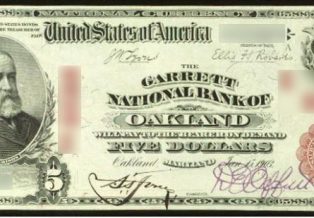All Posts in Coins & Currency

The Mount Vernon First National Bank opened its doors in 1900 and like other banks of the time was permitted to issue its own currency. It did so until 1935, and at least fifteen different bills were produced, one of which is the 1902 $5 note, one of the earliest which has become coveted by collectors.

The Great Britain Royal Arms is a fabulous silver coin which bears the modernized coat of arms which is carried by Queen Elizabeth II. She has the longest reign of any British monarch in history and is masterfully depicted on this one ounce coin.

In the early 20th century, it still was common for banks in the United States to issue their own currency. One such institution was the First National Bank of Kenmore, which was headquartered in New York. One of the bills it issued was the 1929 $5 note, which has become quite rare. Below is an overview of this bill and what to look for when collecting it.

As with most high denomination bills, the value for the 1934 $1000 note is determined by the district of issue, as well as its condition, designation star note, color of the seal and serial number. Out of the 925,464 bills that were originally printed, it is estimated by experts that only 57,222 remain that can be obtained by collectors.

The 1934 $5 Yellow Seal North Africa Silver Certificate is a very interesting note, and is perfect for those who are just getting started in currency collecting. Like other American bills, it has a rich and distinct history and was issued for a specific purpose.

The U.S. government has made some recent changes to the $100 bill, which is designed to enhance its security. This piece of currency is one of the most recognized and traded worldwide, and according to experts the Federal Reserve has been working on the security upgrade since 2003. The new bills were originally scheduled for release in 2011, but due to problems with creases their circulation was delayed.


